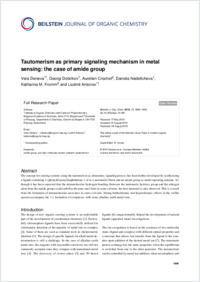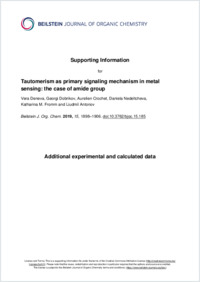Tautomerism as primary signaling mechanism in metal sensing: the case of amide group
- Deneva, Vera Institute of Organic Chemistry with Centre of Phytochemistry, Bulgarian Academy of Sciences, Sofia, Bulgaria
- Dobrikov, Georgi Institute of Organic Chemistry with Centre of Phytochemistry, Bulgarian Academy of Sciences, Sofia, Bulgaria
- Crochet, Aurélien University of Fribourg, Department of Chemistry, Fribourg, Switzerland
- Nedeltcheva, Daniela Institute of Organic Chemistry with Centre of Phytochemistry, Bulgarian Academy of Sciences, Sofia, Bulgaria
- Fromm, Katharina M. University of Fribourg, Department of Chemistry, Fribourg, Switzerland
- Antonov, Liudmil Institute of Organic Chemistry with Centre of Phytochemistry, Bulgarian Academy of Sciences, Sofia, Bulgaria
-
08.08.2019
Published in:
- Beilstein Journal of Organic Chemistry. - 2019, vol. 15, no. 1, p. 1898–1906
English
The concept for sensing systems using the tautomerism as elementary signaling process has been further developed by synthesizing a ligand containing 4- (phenyldiazenyl)naphthalene-1-ol as a tautomeric block and an amide group as metal capturing antenna. Although it has been expected that the intramolecular hydrogen bonding (between the tautomeric hydroxy group and the nitrogen atom from the amide group) could stabilize the pure enol form in some solvents, the keto tautomer is also observed. This is a result from the formation of intramolecular associates in some solvents. Strong bathochromic and hyperchromic effects in the visible spectra accompany the 1:1 formation of complexes with some alkaline earth metal ions.
- Faculty
- Faculté des sciences et de médecine
- Department
- Département de Chimie
- Language
-
- English
- Classification
- Chemistry
- License
-
License undefined
- Identifiers
-
- RERO DOC 327398
- DOI 10.3762/bjoc.15.185
- Persistent URL
- https://folia.unifr.ch/unifr/documents/307990
Other files
Statistics
Document views: 110
File downloads:
- pdf: 159
- Supplementary material: 120

